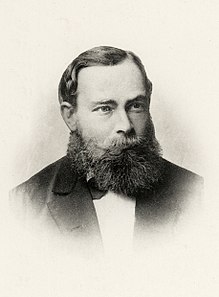
Back Gottlob Frege Afrikaans ፍሬገ Amharic جوتلوب فريجه Arabic جوتلوب فريجه ARZ Gottlob Frege AST Qottlob Frege Azerbaijani قوتلوب فرقه AZB Готлоб Фреге Bulgarian গট্লব ফ্রেগে Bengali/Bangla Gottlob Frege BS
Friedrich Ludwig Gottlob Frege (/ˈfreɪɡə/;[10] German: [ˈɡɔtloːp ˈfreːɡə]; 8 November 1848 – 26 July 1925) was a German philosopher, logician, and mathematician. He was a mathematics professor at the University of Jena, and is understood by many to be the father of analytic philosophy, concentrating on the philosophy of language, logic, and mathematics. Though he was largely ignored during his lifetime, Giuseppe Peano (1858–1932), Bertrand Russell (1872–1970), and, to some extent, Ludwig Wittgenstein (1889–1951) introduced his work to later generations of philosophers. Frege is widely considered to be the greatest logician since Aristotle, and one of the most profound philosophers of mathematics ever.[11]
His contributions include the development of modern logic in the Begriffsschrift and work in the foundations of mathematics. His book the Foundations of Arithmetic is the seminal text of the logicist project, and is cited by Michael Dummett as where to pinpoint the linguistic turn. His philosophical papers "On Sense and Reference" and "The Thought" are also widely cited. The former argues for two different types of meaning and descriptivism. In Foundations and "The Thought", Frege argues for Platonism against psychologism or formalism, concerning numbers and propositions respectively.
- ^ Balaguer, Mark (25 July 2016). Zalta, Edward N. (ed.). Platonism in Metaphysics. Metaphysics Research Lab, Stanford University – via Stanford Encyclopedia of Philosophy.
- ^ Hans Sluga, "Frege's alleged realism," Inquiry 20 (1–4):227–242 (1977).
- ^ a b Michael Resnik, II. Frege as Idealist and then Realist," Inquiry 22 (1–4):350–357 (1979).
- ^ Tom Rockmore, On Foundationalism: A Strategy for Metaphysical Realism, Rowman & Littlefield, 2004, p. 111.
- ^ Frege criticized direct realism in his "Über Sinn und Bedeutung" (see Samuel Lebens, Bertrand Russell and the Nature of Propositions: A History and Defence of the Multiple Relation Theory of Judgement, Routledge, 2017, p. 34).
- ^ a b Truth – Internet Encyclopedia of Philosophy; The Deflationary Theory of Truth (Stanford Encyclopedia of Philosophy).
- ^ Gottlob Frege, Grundgesetze der Arithmetik I, Jena: Verlag Hermann Pohle, 1893, §36.
- ^ Willard Van Orman Quine, introduction to Moses Schönfinkel's "Bausteine der mathematischen Logik", pp. 355–357, esp. 355. Translated by Stefan Bauer-Mengelberg as "On the building blocks of mathematical logic" in Jean van Heijenoort (1967), A Source Book in Mathematical Logic, 1879–1931. Harvard University Press, pp. 355–66.
- ^ Gottlob Frege, The Foundations of Arithmetic, Northwestern University Press, 1980, p. 87.
- ^ "Frege". Random House Webster's Unabridged Dictionary.
- ^ Wehmeier, Kai F. (2006). "Frege, Gottlob". In Borchert, Donald M. (ed.). Encyclopedia of Philosophy. Vol. 3 (2 ed.). Macmillan Reference USA. ISBN 0-02-866072-2.
© MMXXIII Rich X Search. We shall prevail. All rights reserved. Rich X Search
